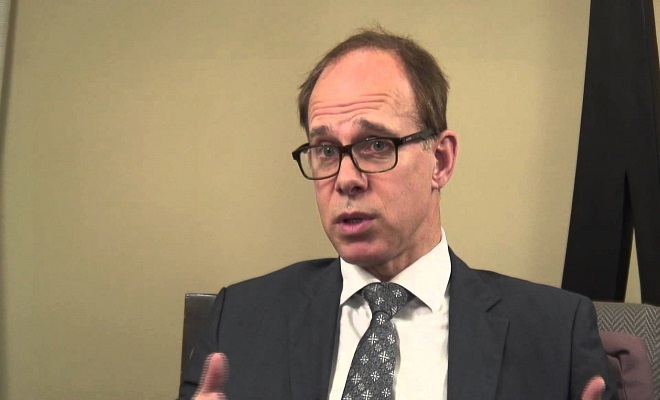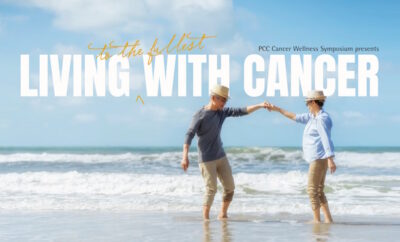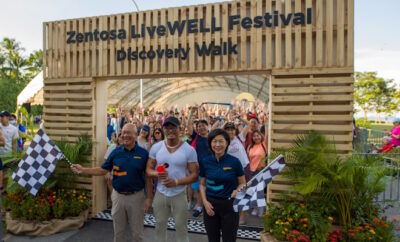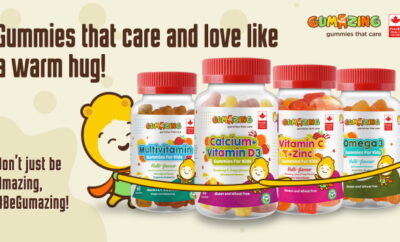
Insights + interviews
In Conversation With Professor Robert Thomas
The author of the book Lifestyle after Cancer, Chair of the Exercise Expert Advisory committee for Macmillan Cancer Support and Editor of the lifestyle and cancer website Cancernet.co.uk, Professor Robert has a wealth of experience in Oncology. We find out more about cancer from the man himself.
AA: The mere mention of the word “cancer” makes a lot of people shudder. What do you always tell your patients about this dreaded disease?
RT: It depends what type of cancer. I do breast cancer, prostate, and bowel and with regards to the word “cancer”, it’s one word but it’s about 500 diseases. So you can be down one end of the spectrum and have metastatic cancer, which means the cancer cells have spread all over your body, and that of course is very sad as they can be terminally ill. Fortunately, that’s the minority and most of the time, especially with early prostate cancer, their life expectancy might well be just the same as if they didn’t have it. In fact, what we’re finding with prostate cancer is they have a non-aggressive tumour, they’ve had the diagnosis for cancer, they then get frightened, they have a thing called the “teachable moment”, and then they go out, they start exercising, their cholesterol comes down, their blood pressure comes down, they start taking things like Pomi-T and other healthy foods. I say, the diagnosis for cancer for you is the best thing that has happened to you, because you’re not going to die from this cancer and probably you know, you’re not going to have a heart attack or a stroke within the next five years as well which you were initially heading for prior to your new found health regime. So it’s not always a bad thing to have cancer, it can actually be a good thing in some cases. It’s hard to convince people of course, that cancer can be a good thing but it’s true. You know, not all cancers are bad and as you have seen from the statistics during the talk, the chance of surviving cancer in recent times has been rising, and as an oncologist, people tell me it must be very sad to be a cancer doctor, but truth be told, cancer doctors have better curees than cardiologists, but people don’t say “Oh it’s very sad being a cardiologist.” do they? So it’s not a death sentence, that’s for sure.
AA: Have people’s perceptions towards cancer changed now, from when you were starting out as an oncologist back then? And how so?
RT: It’s still a very scary word. There are some situations where the medical professionals try to rename diseases which don’t have cancer in them. In fact for early prostate cancer, there was a recent conference in the American Cancer Society which was to try and rename early prostate cancer by eschewing the word “cancer” in an attempt to get rid of that stigma.
AA: By calling it Prostratritis perhaps?
RT: Yes, something like that. Because the survival rates for some early prostate cancer are so good, they shouldn’t have that same fright about it. In fact, many men with early prostate cancer shouldn’t have intervention, they shouldn’t have radiotherapy or prostatectomy because they’ll have to live with the consequences of that treatment, and obviously there are some surgeons who are operating and making money from this when they really shouldn’t have offered that to the patient, and the problem is, patients go along with it because they hear the word “cancer” and they think, “I need treatment now, and I want my prostate tied” which in fact they don’t really need it and something like a cancer fighting supplement can help control it. So there’s a need to change the perception of what cancer is and try to explain that it’s 500 different diseases. For example, if we are talking about breast cancer, it’s actually 10 different diseases within breast cancer, and the same applies for prostate cancer. The situation is improving, as we’re now trying to convince people that you can be screened for prostate cancer, and if you have a slightly elevated level of PSA (prostate specific antigen), that doesn’t mean you need to go and get a prostatectomy. It means you can just maybe tweak your lifestyle and ea and act healthier. The message is slowly getting across, but yes, the word “cancer” is still frightening.
AA: What would you say are the biggest hurdles of patients in battling cancer? What needs to be done to alleviate these hurdles?
RT: Well first and foremost, we need to make sure that we cure as many people as possible, and with treatments which don’t devastate their lives, because all you’re doing is replacing symptoms from cancer with side effects of treatments. So they can go through the cancer treatment process, and be able to carry on working, fend for their families, and live life to the fullest. It’s not just about the quantity of years, it’s the quality as well, and that’s why the survivorship issue is very important. So we’ll need to look at the whole picture and support people more after their cancer treatments. All these are starting to change bit by bit, and I’m sure the doctors in Singapore are now really excited about it, and in Cambridge we are working hard on that. At the end of it all, the emphasis is in developing more effective drugs, more effective radiotherapy, more effective surgery, but at the same time, developing practical lifestyle strategies which can support them.
AA: Are you able to educate our readers on the global cancer situation?
RT: Well, yes, I mean the incidence of cancer is going up slightly. Not as much as you think, actually, it is going up a little. What you can say is that, the chance of being cured of cancer, is significantly going up. So there’s more people around with cancer, so it shouldn’t be a disease or word you should be particularly scared of, but obviously we need more knowledge about it, so people need to be more aware of it. In terms of your readers, it’s still important to look out for the signs of cancer. So if you have blood in your urine, if you cough out blood, if you have a mole which is changing shape and bleeding or getting ulcerated, or any lump that is unexplained, don’t be scared to go to your doctor and seek treatment. Because the earlier you go, the better. Doesn’t necessarily mean you’ll require treatment, but generally speaking, we all know that the earlier cancer is picked up, the more likely you are to be cured, or offered treatment which is not so drastic.
AA: With regards to the incidence, prevalence and mortality rates of cancer, is it a lot higher than it used to be?
RT: The incidence of cancer isn’t actually going up as much as you think. For things like prostate cancer, there was a big rise in incidence when people started screening for it and doing blood tests and things, as such empirically, there was sort of a false increase, because it’s just being picked up. The same goes for breast cancer, because women get their breasts screened and they have tumours picked up earlier, which is good, but sometimes these are benign tumours which will never have bothered them anyway, so you get this false increase. But if you actually look at the risk of significant cancers, there isn’t a significant increase in many tumours. However, for things like testicular cancer, it is worrying as the incidence is increasing. And we do think that there is a correlation with the environment we live in and the pollutants; it’s all the oestrogens in our diet and in our tap water and we do think that that is one of the reasons. So yeah, certain ailments like testicular cancer and brain tumours are definitely increasing.
AA: Last but not the least, let us talk about supplements. It’s a huge industry, could you give us some guidance to how we can approach that when we walk into one of these pharmaceutical stores, as well as talk about antioxidants.
RT: I think you got to be careful where you buy them from. Because there was this rather worrying study from America. I attended an American food supplement congress earlier this year and they did an analysis of what’s in some supplements, and because it’s not regulated like the drug companies, there was about 30 percent of supplements having stuff in them that weren’t supposed to be there. Well the stuff they said was in there, wasn’t there, so you got to make sure that it’s from a reputable source that has a very strict quality assurance process, and there’s a lot of other stuff on the internet now you just don’t know where it’s from and they have very poor quality assurance so it’s worth doing your research and spending a little bit more to get a better product. Also, don’t just follow a trend, for example lycopene – you’ll get some journalists saying, “Oh, tomatoes reduce your risk of prostate cancer”, and then they go “Therefore taking lycopene treats prostate cancer”, and that’s an enormous leap of faith in the evidence. In fact the lycopene didn’t show any effect on prostate cancer, and also some journals emphasised the wrong thing. There was another paper that recently said, “Oh, tomatoes helps all cancers but actually the data showed it was all fruits and vegetables as well as exercise that helps and tomatoes was just one of the many beneficial fruits. So try to read around the articles and don’t follow trends too much. Another example would be the recent thing saying that fish oils cause prostate cancer. Well there was a few worrying data but some of the journalists liked it and created sensationalised headlines. Actually there was no data supporting that fish oil causes cancer, it was probably the increase of fish, because if you have too much fish, like five or six times a week, you are actually taking in too much protein and fat that might contribute to the possibility having cancer, so try to read around what you’re going to take for the rest of your life. But if you got a cold or you’ve got a recent operation, take multivitamins because we’ll probably need them to recover faster, but don’t take those long term. If you have a specific disease, make sure that there is some evidence behind that supplement, unfortunately there is not much evidence behind them.









